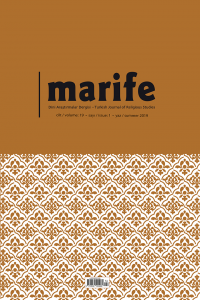
Marife Dini Araştırmalar Dergisi
Yazarlar: Mustafa Fatih AY
Konular:Din Bilimi
DOI:10.33420/marife.800556
Anahtar Kelimeler:Religious Education,Higher Religious Education,Theology Students,Satisfaction,Future Expectation
Özet: The purpose of this study is to analyze the relationship between satisfaction levels (school satisfaction, university satisfaction, satisfaction with personal development, satisfaction with professional education) and future expectations among the theology students. Thus, it is aimed to determine how the education and opportunities provided in theology faculties are evaluated from the perspective of the students and how this evaluation affects the future expectations of the students. In this context, the hypotheses of the research were determined as follows; 1. There is a significant relationship between the satisfaction levels of the theology students and their future expectations. 2. The satisfaction level of the theology students is a significant predictor of the future expectation level. This research has been designed in the relational survey model. The relationship between the level of satisfaction and future expectations of the theology students was examined. The independent variable (predictive variable) in the study is the satisfaction level of the students, while the dependent variable (predicted variable) is the students' future expectations. To address this relationship, firstly correlation and then multiple linear regression analyses were performed. Multiple linear regression analysis is performed to determine the effect of more than one independent variable on a dependent variable. The study group of the research consists of 390 students studying at Ataturk University Faculty of Theology in the fall semester of the 2018-2019 academic year. The data of the study were collected through the Future Expectation Scale, the Student Satisfaction Scale, and the personal information form prepared by the researcher. Personal information form: Information on the participants' gender, class, type of high school they graduated from, and education type were collected through this form. Future Expectations Scale: The one-dimensional scale consists of 14 items. The internal consistency (Cronbach's alpha) coefficient of the scale, whose total variance explained was 49.51%, was found to be 0.84. In this study, the internal consistency (Cronbach's alpha) coefficient was found to be 0.75. Student Satisfaction Scale: The Scale consists of 4 sub-dimensions and 18 items, Satisfaction with the University, explained variance 28.69%, Cronbach's alpha coefficient 0.86, University Satisfaction variance 11.36%, Cronbach's alpha coefficient 0.68, Satisfaction with Personal Development 14.28%, internal consistency explained Consistency (Cronbach's alpha) coefficient 0.79, Professional Education Satisfaction (explained variance 25.35%), internal consistency (Cronbach's alpha) coefficient 0.7. The total variance explained by the whole scale is 79.68%. The internal consistency (Cronbach's alpha) coefficient of the whole scale is 0.85. In this study, internal consistency (Cronbach's alpha) coefficients were determined as 0.67, 0.51, 0.84, 0.68 for the sub-dimensions, and 0.86 for the whole scale, respectively. Kurtosis and skewness values were examined to check whether the necessary conditions for parametric analysis were met. It has been determined that the values are between -1 and +1. In the light of these findings, it is understood that the data set has a normal distribution and therefore parametric tests can be performed. The analysis of the data was analyzed with JASP (Version 0.11.1), an open-source data analysis program supported by the University of Amsterdam. The relationship between priority satisfaction level and the future expectation was analyzed using the Pearson Product-Moment Correlation. When the relationship between the future expectation levels and satisfaction levels of the theology students was examined, it was found that there were positive correlations between the variables. With the determination of this significant relationship, the first hypothesis of the study, "There is a significant relationship between the satisfaction levels of the theology students and their future expectations” was confirmed. Thus, multiple linear regression analysis was conducted to test the second hypothesis and determine the predictive effect of this relationship. As a result of multiple linear regression analysis, satisfaction with personal development and professional education were found to be a high and significant predictor of future expectation (R = .44, R2 = .19, p <.01). Accordingly, satisfaction with personal development and satisfaction with professional education explains 19% of the total variance in future expectations. Researchers should conduct studies addressing the satisfaction dimensions that are likely to affect students' expectations for the future. For the student to improve himself/herself in the profession he/she plans to do in the future, his/her expectations must be determined, and arrangements must be made on these issues. Determination of student expectations by both researchers and institutions should be repeated from time to time and a dynamic process should be operated in this regard. Also, since the sample of the study is limited to the province of Erzurum, similar studies to be conducted in the samples of different theology faculties will be important in terms of allowing comparison of the results.